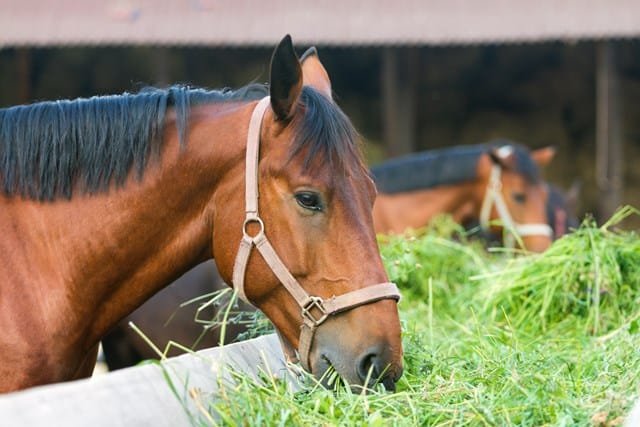Feeding alfalfa safely requires careful attention to your horse’s specific needs, health conditions, and activity levels. Here’s a guide on how to feed it:
- Determine the Right Horse for Alfalfa
Alfalfa is best suited for horses that are in a growth stage (foals), pregnant or lactating mares, or horses involved in intense work. Horses in maintenance or with metabolic disorders should generally avoid it or only consume it in moderation. Always consult with your vet to determine if alfalfa is appropriate for your horse. - Gradually Introduce Alfalfa
If your horse has not previously eaten alfalfa, introduce it slowly to avoid digestive upset. Start by mixing small amounts of alfalfa hay with their regular hay, gradually increasing the proportion of alfalfa over several days. - Feed in Moderation
For adult horses that do not require a high-protein diet, alfalfa should only be fed in moderation. Overfeeding can lead to an imbalance in nutrients. For non-working adult horses, it’s typically recommended to feed grass hay instead of alfalfa, as it is lower in protein and calcium. - Monitor Calcium and Protein Intake
Horses on an alfalfa diet should be monitored for calcium and protein levels. Consider testing your horse’s bloodwork regularly, especially if they are prone to metabolic disorders. Keep track of how much alfalfa they are consuming to ensure they don’t exceed the necessary nutrient intake. - Provide Fresh, Clean Hay
Always ensure the alfalfa hay is fresh, free from mold or dust, and stored properly. Moldy hay can lead to respiratory issues, while excessive dust can cause lung problems. High-quality hay should be green and sweet-smelling, free of any signs of spoilage. - Ensure Balanced Diet with Grass Hay
While alfalfa is nutrient-dense, it should be part of a balanced diet. If you’re feeding alfalfa, make sure the horse also has access to other types of hay, such as grass hay, to provide variety and avoid an over-concentration of certain nutrients. - Adjust Based on Activity Levels
Horses in heavy work or high activity may require the higher protein and energy from alfalfa. However, horses in light work, pasture-kept, or older horses may not need alfalfa’s rich nutritional profile. Adjust portions based on their energy expenditure and overall health needs. - Hydration
Alfalfa hay can be quite rich and high in minerals, so make sure your horse has access to fresh, clean water at all times. Adequate hydration is crucial when feeding alfalfa, especially to prevent dehydration or kidney strain from the excess protein and calcium. - Monitor for Health Issues
Keep an eye on any potential health changes, such as weight gain, changes in coat condition, or behavioral issues, when introducing alfalfa. If you notice anything unusual, consult your veterinarian immediately.
Signs of Alfalfa Overfeeding and What to Do
If alfalfa is fed in excess or to a horse that cannot handle its nutritional profile, you might notice signs of overfeeding. Common signs include:
- Obesity: Overfeeding alfalfa can lead to weight gain, especially in sedentary or senior horses.
- Digestive upset: Diarrhea, bloating, or colic may occur if your horse’s digestive system is overloaded.
- Lameness: For horses with metabolic disorders, excess protein or calcium may contribute to laminitis or other issues affecting the hooves and joints.
If you notice any of these signs, reduce the amount of alfalfa and consult your veterinarian for a full assessment and dietary recommendations.
Conclusion: Feeding Alfalfa to Horses
Feeding alfalfa hay can be an excellent choice for certain horses, particularly those that need higher protein, calcium, and energy levels, such as growing foals, pregnant mares, and working horses. However, it is essential to tailor your horse’s diet to its individual needs and consult with a veterinarian if you are unsure whether alfalfa is right for your horse.
As with any aspect of horse care, balance is key. While alfalfa can be a nutritious addition to a horse’s diet, it must be fed in the right quantities and to the right type of horse. With careful attention to your horse’s specific requirements, you can safely incorporate alfalfa into their diet to support their health and well-being.

